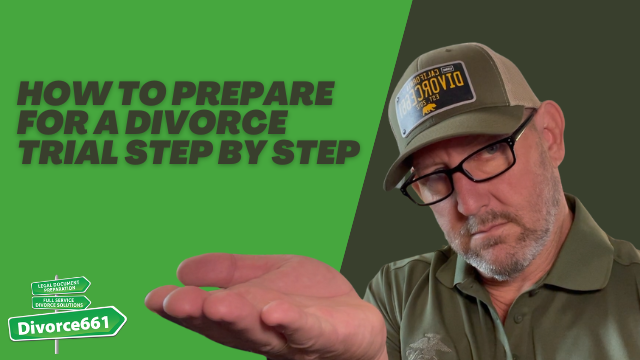How to Prepare for a Divorce Trial Step by Step
Divorce can be a daunting process, especially when it escalates to a trial. While many divorces settle outside of court, understanding how to prepare for a divorce trial is crucial if your case is heading that way. Let’s dive into the essential steps to get ready for a divorce trial in California, ensuring you’re well-prepared to present your case confidently.
Understanding the Divorce Trial Process
A divorce trial occurs when the spouses cannot agree on significant issues such as custody, support, or property division. In these situations, the court schedules a trial date where both parties present evidence and testimonies, allowing a judge to make the final decision. But before you step into the courtroom, it’s vital to prepare adequately.
Step 1: Organize Your Documents
The first step in preparing for your divorce trial is to gather and organize all necessary documents. This includes:
- Financial Disclosures: Bank statements, pay stubs, and tax returns.
- Property Records: Deeds, titles, and any relevant paperwork regarding assets.
- Child Custody Documents: Communication records, school reports, and visitation logs.
Having these documents ready will help you present a solid case. The court will rely on this information to make informed decisions, so ensure everything is accurate and up-to-date.
Step 2: Prepare Your Trial Brief
Your trial brief is a written summary of your position on each issue in the divorce. It outlines the evidence you plan to present and is essential for framing your case. A well-prepared trial brief can significantly influence the outcome of your trial. Here’s how to write one:
- Summarize Your Position: Clearly state your stance on each contested issue.
- List Evidence: Include all evidence you plan to present, such as documents and witness testimonies.
- Legal Arguments: Reference any applicable laws or precedents that support your case.
Remember, if your trial brief is not prepared properly, it can adversely affect your case.
Real-Life Example: Helping a Self-Represented Client
Here at Divorce661, we often assist clients who are representing themselves. For instance, we had a client with a trial just a month away who had made little to no preparations. We stepped in to help them organize their trial brief, exhibits, and witness list. With our guidance, they walked into court organized and confident, ready to present their case effectively.
Why Choose Divorce661?
At Divorce661, we specialize in helping individuals prepare for divorce trials without representing them in court. Here’s what we offer:
- Trial Document Preparation: We prepare all necessary documents, including trial briefs, witness lists, and supporting documents.
- Meeting Deadlines: We ensure you meet all court deadlines and formatting requirements.
- Flat-Fee Structure: Our services are offered at a flat fee, eliminating hourly attorney fees.
If you’re facing an upcoming trial, visit Divorce661.com for a free consultation. We’ll make sure you’re ready and give you the best chance of presenting your case clearly and effectively.
Step 3: Create a Witness List
Identifying and preparing witnesses is another critical component of your trial preparation. Your witnesses can provide testimony that supports your claims. Here’s how to create an effective witness list:
- Choose Relevant Witnesses: Select individuals who can speak to the issues at hand, such as friends, family, or professionals.
- Prepare Them: Ensure your witnesses understand what to expect during the trial and the importance of their testimony.
- Document Everything: Keep records of any communication with your witnesses regarding their expected testimony.
Step 4: Understand Court Procedures
Familiarize yourself with the court procedures and how trials are conducted in California. Understanding what to expect can alleviate some of the anxiety associated with going to trial. Here are some important aspects to consider:
- Trial Structure: Know the typical structure of a trial, including opening statements, witness examinations, and closing arguments.
- Evidence Presentation: Understand how to present your evidence effectively, ensuring it’s clear and compelling.
- Judge’s Role: Recognize that the judge will make decisions based on the evidence presented, so clarity and organization are crucial.
Step 5: Prepare for Emotional Challenges
Going through a divorce trial can be emotionally taxing. It’s essential to prepare yourself mentally and emotionally for the experience. Here are some tips:
- Seek Support: Lean on friends, family, or a therapist for emotional support during this challenging time.
- Practice Self-Care: Engage in activities that help you relax and recharge, whether it’s exercise, meditation, or hobbies.
- Stay Focused: Keep your goals in mind and remind yourself why you are going through this process.
Final Thoughts
Preparing for a divorce trial step by step can feel overwhelming, but with the right approach, you can navigate the process effectively. By organizing your documents, preparing a solid trial brief, creating a witness list, and understanding court procedures, you’ll set yourself up for success in court. Remember, you don’t have to do it alone. If you need assistance, reach out to us at Divorce661 for support and guidance. Together, we can help you present your case confidently and clearly.
What’s the most intimidating part of preparing for a divorce trial? Share your thoughts in the comments below!


